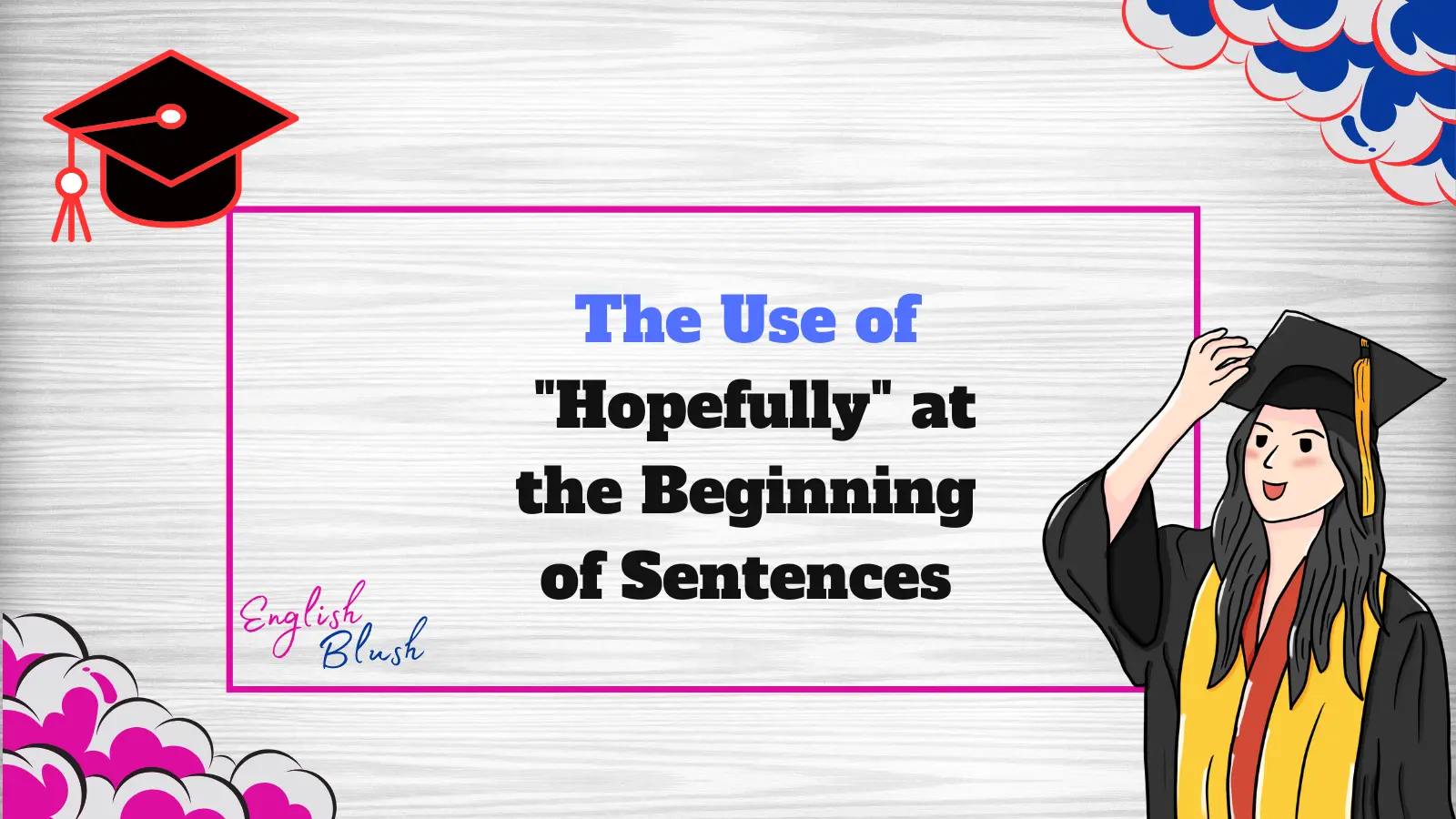Using the word “hopefully” at the start of a sentence can be a useful way to express a hope, wish, or expectation. But like many English language quirks, there’s more to it than simply placing it in front of a sentence. This article will explain when it’s appropriate to start a sentence with “hopefully,” how to do it properly, and offer alternatives to consider in both formal and informal settings.
What Does “Hopefully” Mean?
Before diving into sentence structure, it’s essential to understand the meaning of “hopefully.” The word is an adverb that generally expresses optimism or a desire for something to happen. It suggests that the speaker wishes or expects a certain outcome.
For example:
- “Hopefully, it will stop raining soon.”
- “I’ll get the job I applied for, hopefully.”
In both cases, the word signals a desire for a positive result. It shows uncertainty about the outcome, but the speaker remains optimistic.
Using “Hopefully” in Formal Contexts
In formal writing or speech, “hopefully” is often viewed as less professional. However, this does not mean it should be avoided altogether. Understanding when to use it and when to choose alternatives is key.
The Potential Pitfall of Informality
Starting a sentence with “hopefully” can sometimes be seen as too casual for formal contexts. Especially in more academic or professional settings, avoiding informal phrases like “hopefully” can strengthen the tone of your writing. For example, if you’re writing a business proposal or academic paper, it’s better to be precise and avoid hedging the message.
Alternatives to “Hopefully” in Formal Writing
Here are some formal alternatives you can use in place of starting a sentence with “hopefully”:
- “I hope that…”
Rather than saying “Hopefully, the meeting will be rescheduled,” you could say, “I hope that the meeting will be rescheduled.” This phrasing sounds more professional and clear. - “It is expected that…”
When expressing a sense of expectation in a formal setting, you might choose “It is expected that…” For example: “It is expected that the new policy will bring positive changes.” - “There is a likelihood that…”
This option can be a good fit when you’re focusing on a more neutral, objective tone. Example: “There is a likelihood that the project deadline will be extended.” - “We anticipate that…”
In corporate or business settings, anticipating outcomes is often more effective than relying on emotional expressions like “hopefully.” For example: “We anticipate that customer satisfaction will improve after these changes are implemented.”
Example of Formal Context:
Instead of writing:
- “Hopefully, the proposal will be accepted by the board.”
You could write:
- “We anticipate that the proposal will be accepted by the board.”
This maintains a sense of professionalism while expressing your expectations.
Using “Hopefully” in Informal Contexts
On the other hand, in casual conversations or informal writing, “hopefully” is much more acceptable. In fact, it can help express your personality and wishes in a friendly way, which is exactly what informal contexts are for.
Why It’s More Common in Informal Settings
When you’re texting a friend, writing a casual blog post, or speaking in everyday conversations, the tone can be relaxed, allowing for phrases like “hopefully” to add an element of warmth. It softens the message and conveys a hopeful feeling, even if the outcome isn’t certain.
For example, saying, “Hopefully, we can hang out this weekend!” sounds more friendly and informal compared to, “I expect we can hang out this weekend.”
Example of Informal Context:
Instead of writing:
- “I hope that we meet again soon.”
You could say:
- “Hopefully, we meet again soon!”
The phrase has a warmer, friendlier tone, which is well-suited for casual conversations or interactions.
Using “Hopefully” in Spoken Language
When you’re speaking, using “hopefully” is common and often spontaneous. People use it to share their hopes without worrying about sounding too formal or overly precise. Here’s an example:
- “Hopefully, they like the gift I bought them!”
Such expressions sound natural in everyday conversations and interactions. They let others know you’re feeling optimistic and share your desires in a lighthearted manner.
Some Things to Keep in Mind When Using “Hopefully”
While starting a sentence with “hopefully” is perfectly fine in informal conversations and even some formal cases, it’s important to remember a few things to ensure you’re using it correctly.
Avoid Misplacing Your Modifiers
One common mistake people make is using “hopefully” without considering where it belongs in the sentence. Because “hopefully” modifies the verb that follows, it should typically appear before the verb in informal speech. However, in formal writing, its usage tends to get more complicated.
Example:
- Incorrect: “It will, hopefully, rain tomorrow.”
- Correct: “Hopefully, it will rain tomorrow.”
The correct placement of “hopefully” ensures the sentence structure is smooth and doesn’t sound jarring.
Consider Clarity Over Emotion
While “hopefully” adds emotion and expresses a desire, not all writing or speaking situations need that level of emotional expression. If clarity is a priority over expressing feelings, other structures such as “it is likely that…” or “we expect…” may suit the situation better. Depending on the formality and context, it’s worth asking yourself: Is this sentence clearer or stronger without “hopefully”?
When NOT to Use “Hopefully”
While “hopefully” works well in most contexts, it is essential to recognize situations where it may be better not to start a sentence with it.
Avoid in Objective Reports
In highly technical or scientific reports, it’s best to avoid subjective language like “hopefully.” For example, when writing a scientific study or providing a report to your boss, statements like “Hopefully, this will lead to a breakthrough” sound unprofessional and vague. Stick with facts and clear statements: “This is expected to lead to a breakthrough” is much stronger and more objective.
Avoid Overusing “Hopefully”
While “hopefully” can help convey a sense of optimism or desire, overusing it can make your writing repetitive or overly informal, especially in professional documents. It’s important to vary sentence structure and use other expressions that communicate your intent more precisely.
Conclusion
Whether you are crafting a formal document or sending a casual message, the word “hopefully” can help express optimism, wishful thinking, or desire. However, understanding the nuances of how and when to use “hopefully” is key to maintaining clarity and appropriateness in different contexts.
In formal writing, focus on alternatives like “I hope that,” “It is expected that,” or “We anticipate” to present your ideas clearly and professionally. On the other hand, “hopefully” fits perfectly in informal contexts, where it’s often used to express casual thoughts or hopes. So next time you write or speak, think about your audience and choose whether “hopefully” is the right word for the situation





